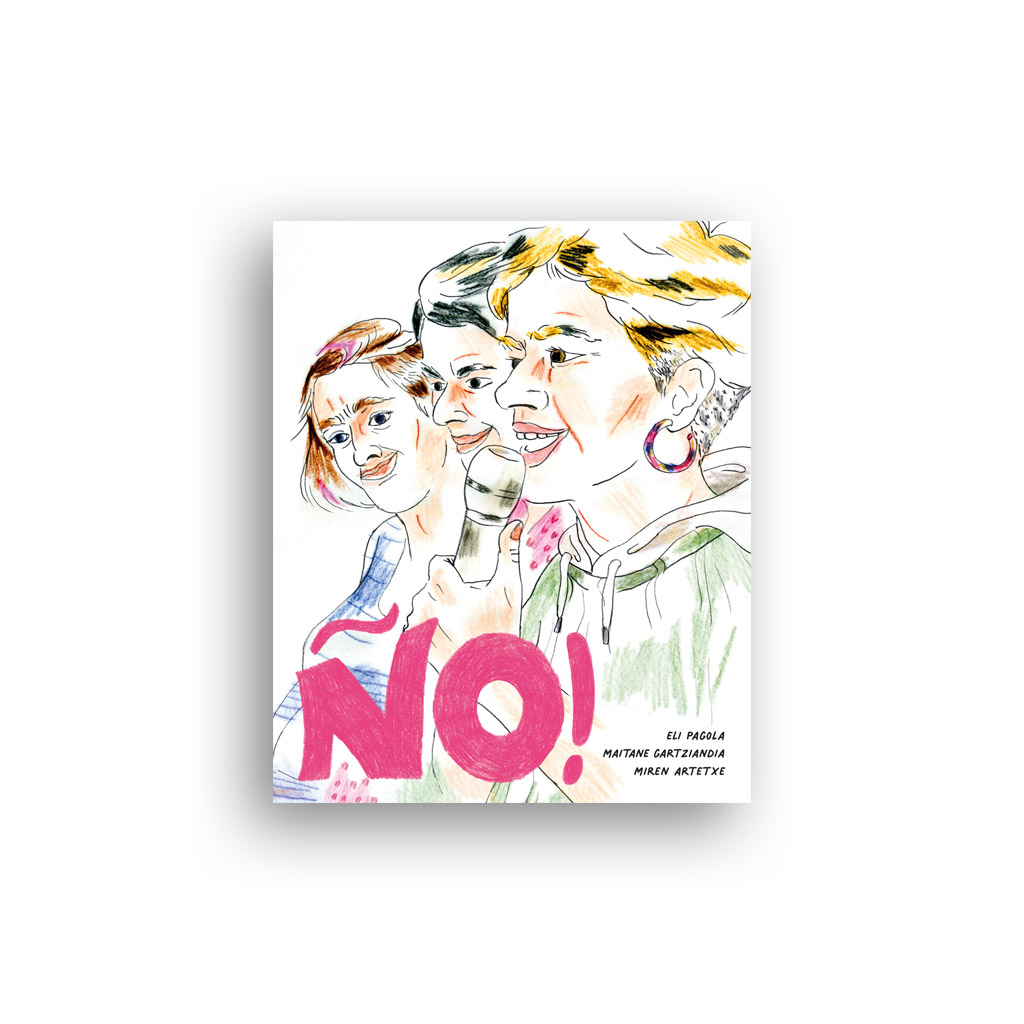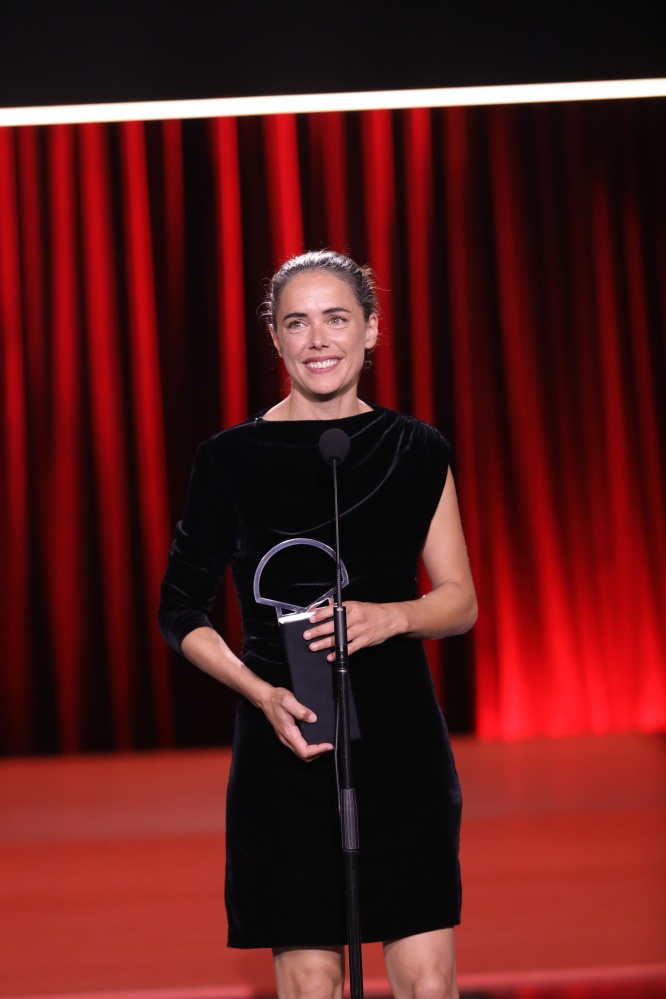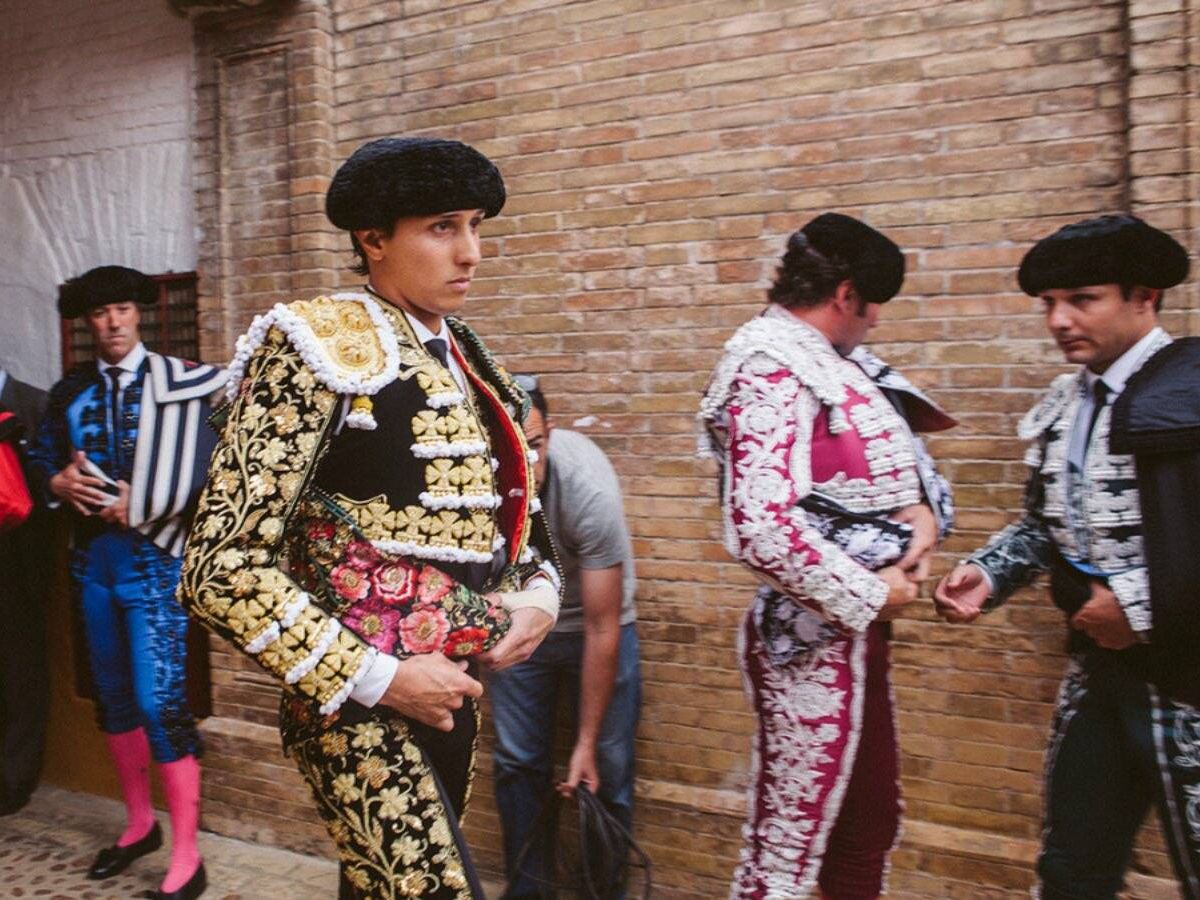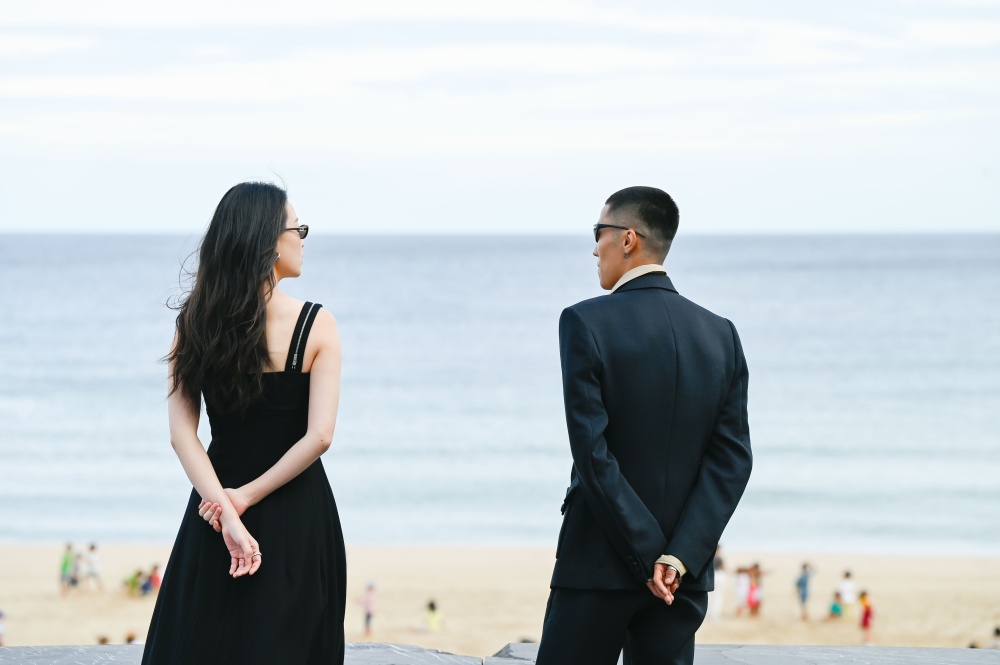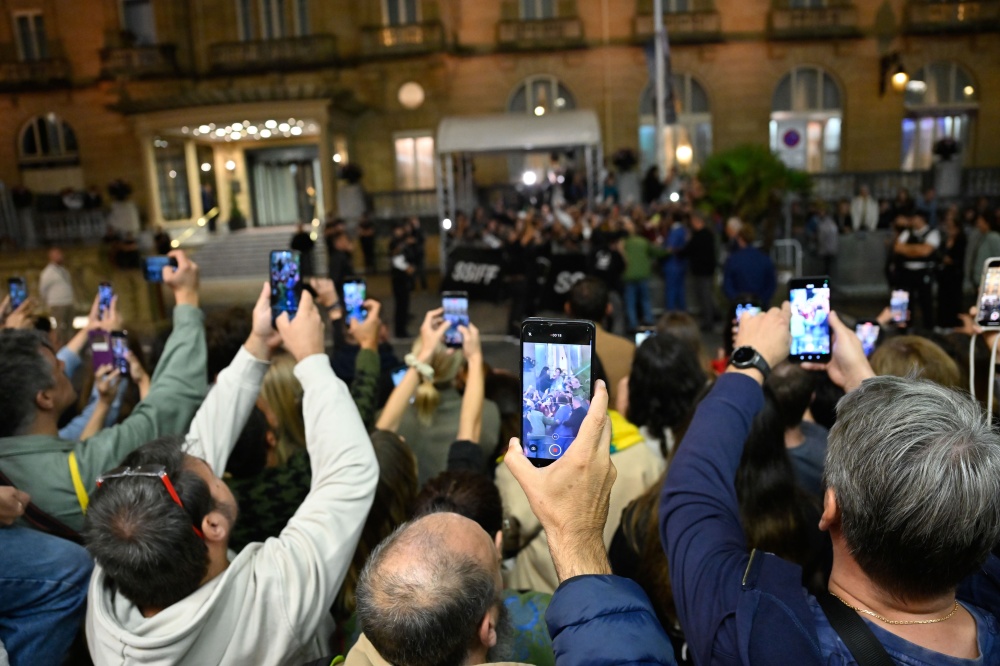"Marco created his own Fictional Frame"
- It has not been an easy film for the Moriarti, who have dared to look. The project was born eighteen years ago and was interrupted at least twice, on both occasions, after Enric Marco gave him a "surprise." In the end, rather than in a documentary, history has been reflected in a fiction. The documentary is directed by Aitor Arrangi, Jose Mari Goenaga and Jon Garaño, and has the collaboration of Jorge Gil Munarriz in the creation of scripts. [More information about Enric Marco in this article]

After passing through Venice, one of the most important film festivals in the world, the next stop of Marco is the San Sebastian Film Festival, and then they will be in Vancouver, London and Toulouse before reaching the theatres – from November 8th in film. Next, and following the usual trajectory of films, it will reach television and platforms in 2025.
They have had a “nice” experience in Venice, as Jon Garaño told ARGIA. After receiving “many applause” at the end of the film, they were approached by “a lot of people” to ask about the film and about Enric Marco. People felt “very interested” and are very happy.
Moriarti's film has already had a long trajectory at this time when they are
immersed in the premieres: they have not spent eighteen years of the project. Starting from the proposal of his colleague Jorge Gil Munarriz, Gil Munarriz met several times with Enric Marco in Barcelona in 2006, a year after he became aware of the fraud. No camera. “The initial idea was to make the documentary, but at one point Marco told us he had to go to Germany to look for some documents, from that jail that was actually in jail because he wanted to certify himself,” says Garaño. The Moriarti told him they would want to help him and record the trip, but Marco didn't want because the trip was very personal. They understood the decision.
They were at the door of the first surprise. “When he returned from that journey he told us that he had gone to Germany with another team of filmmakers and that he had also signed an exclusive contract with them to make a documentary, of course, for us it was a great shock. Then we reject the idea.”
Four years later, at the San Sebastian Film Festival, the Moriarti participated in an industry forum. They were looking for funding for another project, usually private meetings, which do not appear either in the press or anywhere. From this room came Marco, accompanied by his wife, with a butifarra in his hand: I wanted to make a new documentary about him, because I was nothing happy with the above. Friends nodded, thinking they should seize the opportunity.
Therefore, months later, in March 2011, Marco was taken to his headquarters in Moriarti in Pasaia, where he was interviewed for three days, receiving 15-hour material in question-answer format.
The second surprise was about to come. “The material stayed there, we didn’t know exactly what to do, we started with Loreak and we thought we needed more grips. So when the writer Javier Cercas wrote an autobiography about Marco, it occurred to us that Cercas himself could be integrated into the documentary and that we could also give a fictional aspect to the project. Marco agreed and we agreed that he would talk to Cercas. But he didn't. Jorge [Gil Munarriz] returned to Barcelona and there we realized that Cercas did not know anything; we told him and he did not like the idea. So, seeing the play that Marco made us, we rejected the project again.”
In 2014, they came up with the idea of telling Marco's life, instead of a documentary, for a fictional movie. “Marco ended up creating a fiction with his image. So why not count it fictiously? It gave the opportunity to talk about it; how fictions arise and the importance of truth.” In addition, fiction, according to Garaño, allows to reach a wider audience.
Fleeing the gray life
Garaño and his colleagues have analyzed the figure of Enric Marco from top to bottom: “For our part, the most interesting thing was that Marco, his image, is a fiction; he created another Enric Marco to escape his gray life, which achieved success, unlike the others.” Marco was able to emote people, to gain admiration and to receive affection. “That’s why he did,” said Garaño.
"Marco ended up creating a fiction with his own image. So why not count it fictiously?
It is evident, and Garaño emphasizes it, that even when the truth is revealed, Marco does not “completely” renounce the image he has created and “keeps it”. Therefore, as Marco created his own Marco, they were able to devote themselves to fiction: “We told ourselves that when we decided to make fiction, we could create a third Enric Marco.”
In addition, from the deepest point of view, Garaño believes that there are also different issues that can give rise to thinking: “How stories tell us, sometimes stories are manipulated, how they are understood, how the covenants are between the author and the recipient... and we want, in some way, to spread the spirit of Marco.” If a story is manipulated, however, it often has a part of reality, however small it may be, there is its point of truth. What Marco was, basically, that: Germany was in the Nazi and was also a prisoner. I mean, he took some things from reality, mixed them with fiction and built his own discourse.
Knowing the truth and truth is one of the most important issues in the film. Garaño believes that it can lead us to a reflection: “We do not know what is true and what is not, because there is a lot of information in each of the issues, they are all affirmed as truth, and in these times of post-truth, in this complicated world, I think it is important to distinguish what is true and what is not, also in the film we wanted to tell.”
Bound in Heaven
Address: Xin Huo
Country: China
Duration: 109 minutes
Premiere: Not implemented
Run away from death, forward. The man who suffers a terminal illness will do so, along with his lover, friend and travel partner. A hard but positive film, with good image... [+]
The ninth and final day, at a special festival that will remember me with great affection. Leaving two films risky for the last day, I'm writing this first chronicle with the music of a bar, because I didn't like the movie I saw before.
I've seen Ulysses in the program of the... [+]
And that was Saturday and not Sunday. It was hard for him to clear up the day, because there were far fewer people on the street and there was no hurry. Some soon approached Kursaal and Victoria Eugenia Theatre, where they projected the closing movie of the night, We Live in... [+]
The Gasteiztarra Patricia López de Arnaiz has been made with the Goya the best lead actor at the 72 San Sebastian Festival. In the Zinemaldia, for his work in the film 'The Flashes', directed by Pilar Palomero.
The film is based on the first narrative of Eider Rodríguez's book... [+]
I never cry with movies. I've seen hard films, sad stories, full of death, showing the worst of the human being, without asking for forgiveness. I've seen beautiful, elegant, monumental movies that talk about miracles, deep. And yet, I don't cry with movies. Those of us who... [+]
Although outside the Concha de Oro competition and other awards, other – usually good – works are premiered in the Official Section. In particular, there are sixteen competing films and 22 films – twenty films and two telescopes – are in projection.
One of the series... [+]
When I made the Festival calendar, the first film I chose was Parthenope. Not knowing what it was, before I read the synopsis, I knew I had to see it, because it was from director Paolo Sorrentino. My roommate and roommate always tells me that I’m an “excited” with that... [+]
On Wednesday, the Greek Costa-Gavras was at Donostia-San Sebastian, at 91, presenting his new work and giving him the level with Le dernier souffle; and on Thursday the British Mike Leigh, with an elegant black cane and an 81 year old luggage.
New old ones? No. And I'm not... [+]
Family dynamics that have been worsening for too long tend to become chronic and cannot be easily cured. In the feature film written and directed by Sandra Romero, where the silence passes (The place that passes the silence), Antonio (Antonio Araque) returns to Ecija (Andalusia)... [+]
There is sometimes a feeling that everything is tied. It will be possible to see everything, even in the Official Section, always under a framework. We have seen some touches of humor, weeping dramas, suspenses, documentaries, even a horror film – which we will analyze at the... [+]
On June 28 of this year, Casa in Flames (Etxea Sutan), a dramatic comedy directed by Dani de la Orden, premiered. I told him I thought I would see him a month before the festival, when I was talking to a friend, and he recommended it to me. Although we do not always agree, the... [+]
Always within a framework, but we are seeing everything in the Official Section of the Festival. And that, to tell the truth, is appreciated. There’s a big difference between the dozens of “smell your eggs” in this bullfighter’s movie and the infinite silences of On... [+]











